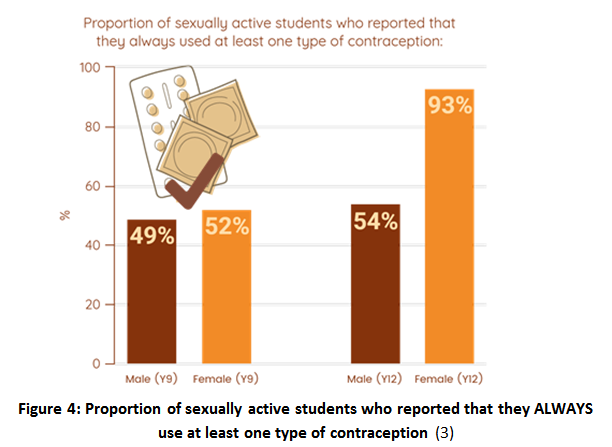![]()
 Teenage pregnancy
Teenage pregnancy
Headlines
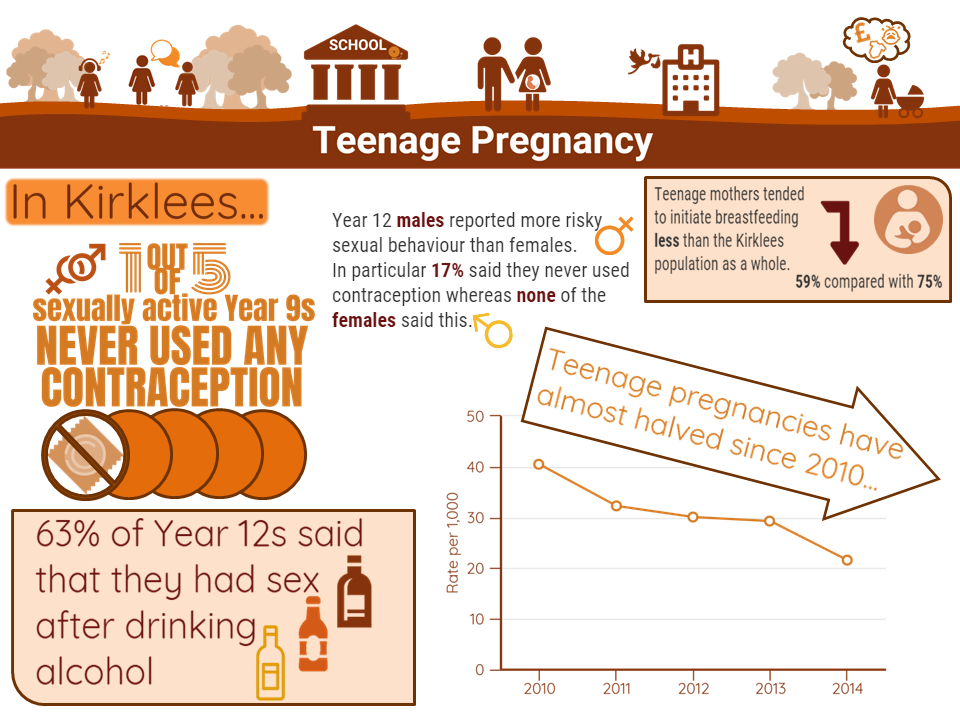
Why is this issue important?
Teenage pregnancy is defined as under-18 conceptions including those leading to live births and terminations. Teenage pregnancy is seen as a public health issue due the wider associations with poor health and wellbeing along with limiting education, career and economic prospects (Figure 1). This leads to the creation of a young vulnerable family with a range of support needs.
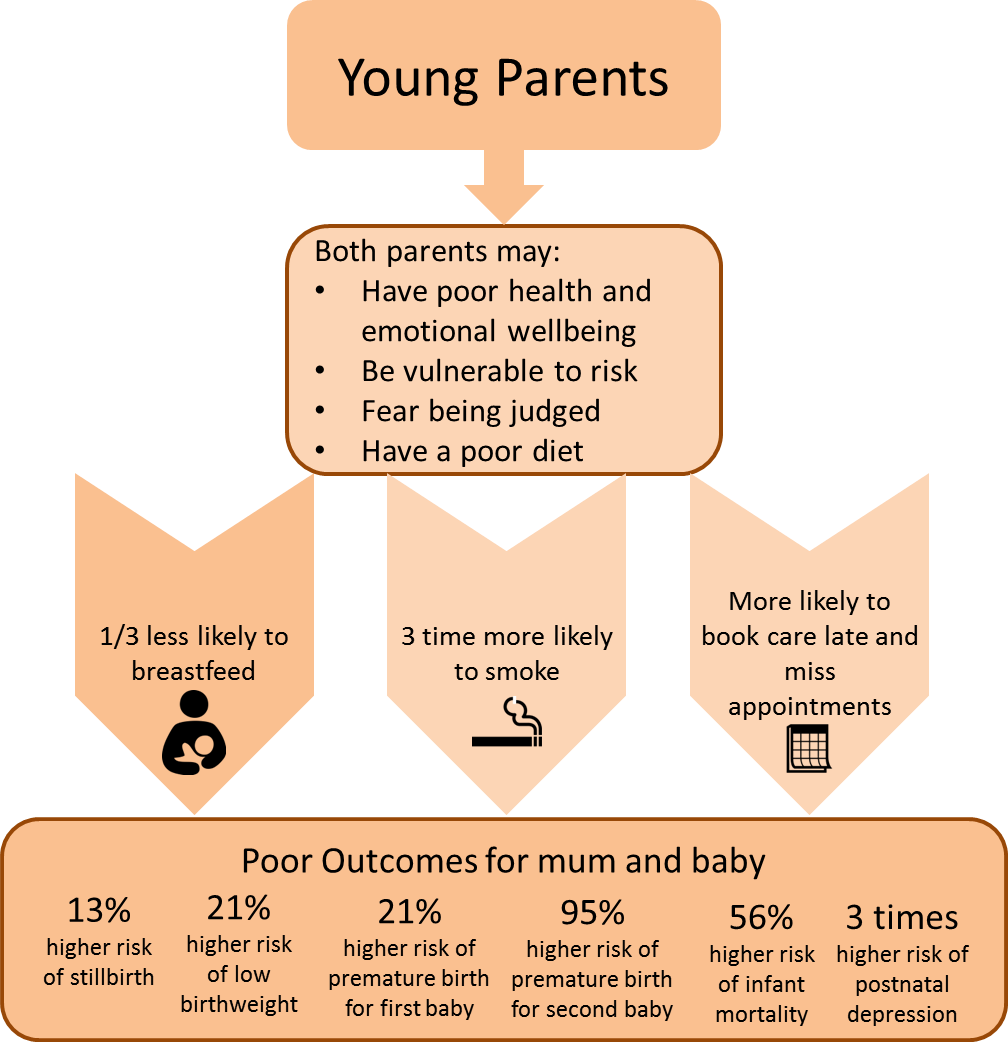
Figure 1: Data taken from a Framework for supporting teenage mothers and young fathers (1)
Teenage pregnancy can have a significant negative impact, on the teenage parents and their child, in terms of inequalities, life chances and health and wellbeing. There is no one intervention that can reduce teenage pregnancies, rather a range of interventions and prevention strategies are required to ensure sustainable reductions in teenage conceptions.
Evidence and lessons learned from other areas show that poor outcomes for teenage parents are not inevitable if early, coordinated and continued support is in place. Any support made available needs to be trusted by young people and focus on building their parenting skills, self-confidence and long term ambitions.
An individual’s life circumstances may mean bringing up a child can be incredibly difficult, there are increased risks of poor outcomes for teenage parents and their child which can be seen in Figure 2.
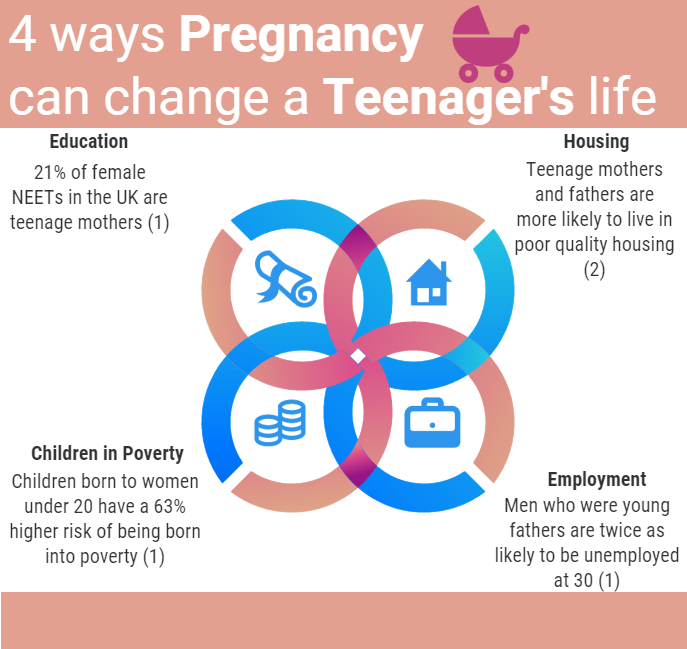
Figure 2: 4 ways pregnancy can change a teenager’s life
What signficant factors affect this issue?
Young people at risk of teenage pregnancy include those with low educational attainment, a dislike of school and poor attendance, poor emotional and mental health, those who are in contact with the Police and those living in and leaving care (2). Almost 60% of children involved in serious case reviews were born to mothers under 21 years old.(1)
Incidences of teenage pregnancy are likely to be explained by several reasons including:
Engaging in sexual intercourse at a young age (3)
Engaging in sexual activity at a young age is a pre-requisite for teenage pregnancy. Those young people that do not engage in a consistent and appropriate contraception regimen in all instances are at increased risk of teenage and unwanted pregnancies.
Not in Education, Employment or Training (NEET)
NEET refers to a young person who is “Not in Education, Employment, or Training”. National and local data suggests that young women aged 16 to 18 who are NEET are at greater risk of teenage pregnancy, poor sexual health and poor outcomes in later life. Nationally, one in five young (21%) women who are aged between 16 and 18 and NEET are teenage mothers.(1) Calderdale and Kirklees (C&K) Careers is a local service providing support and careers information, advice and guidance services about employment, education and training. They capture data about those using their service. During 2014, an average of 36% of the 16 to 18-year old women who they were supporting in education, employment and training (EET) were identified as being teenage mothers.
Risky behaviours
Alcohol intoxication is associated with increased risks that people will have unprotected sex.(4) Failure to use a condom during a young person’s first sexual encounter is linked to alcohol consumption. Having such unprotected sex also increases the likelihood of contracting sexually transmitted diseases.(4) (See sexual health section of the JSA)
- 51% of all respondents said they had had sex after drinking alcohol. This was higher among females (57%) than for males (46%).(3)
- 42% of Year 9s said they had had sex after drinking alcohol compared to 63% of Year 12s.(3)
- 16% of young people who have become pregnant have a repeat pregnancy within 12 months of the first. This increases to 24% within 24 months of their last pregnancy.(5) (FNP 3 year average)
Awareness
- Information, advice and support given to young people about sex and relationships can influence young people’s attitudes to sexual behaviour. This can provide the tools needed to delay sexual activity as well as ensuring the effects of risky sexual behaviour are understood.
- Myths about sex, fertility and abortion still exist and awareness of the full range of contraception is low.
- A significant number of parents lack the knowledge and confidence to talk to their children about sex and relationships. Sex and relationships education (SRE) is a non-statutory curriculum subject for schools and post-16 learning. The only statutory requirement is in the science based reproduction element of the curriculum, this results in educational approaches being patchy and inconsistent.
- The wider children’s workforce is not equipped to talk to young people about relationships and their sexual health. Educational approaches in schools remain poor, chiefly because Personal Social Health Education (PSHE) remains non-statutory. However, section 2.5 of the national curriculum states that all state schools ‘should make provision for personal, social, health and economic education (PSHE), drawing on good practice’. In Kirklees we it is called PSHCE ed which stands for Personal, Social, Health, Citizenship, Economic education, and the subject matters are enormous in terms of what can be covered.
Other factors
- Research shows looked-after children and care leavers are three times more likely to become teenage mothers than peers who have not experienced state care.(6)
- Experiencing sexual abuse or exploitation – Locally systems are in place to identify those at risk or affected by child sexual exploitation. While there have been instances of pregnancy reported in Child Sexual Exploitation (CSE) victims, numbers are low.
What does the local data tell us?
The 2014 Kirklees Children and Young People’s survey (3) included specific questions relating to sexual behaviours for students from Year 9 (aged 13 to 14 years) and Year 12 (aged 16 to 17 years). The responses reinforce significant causes and need for suitable support for young people in Kirklees:
Sexual activity and use of contraception
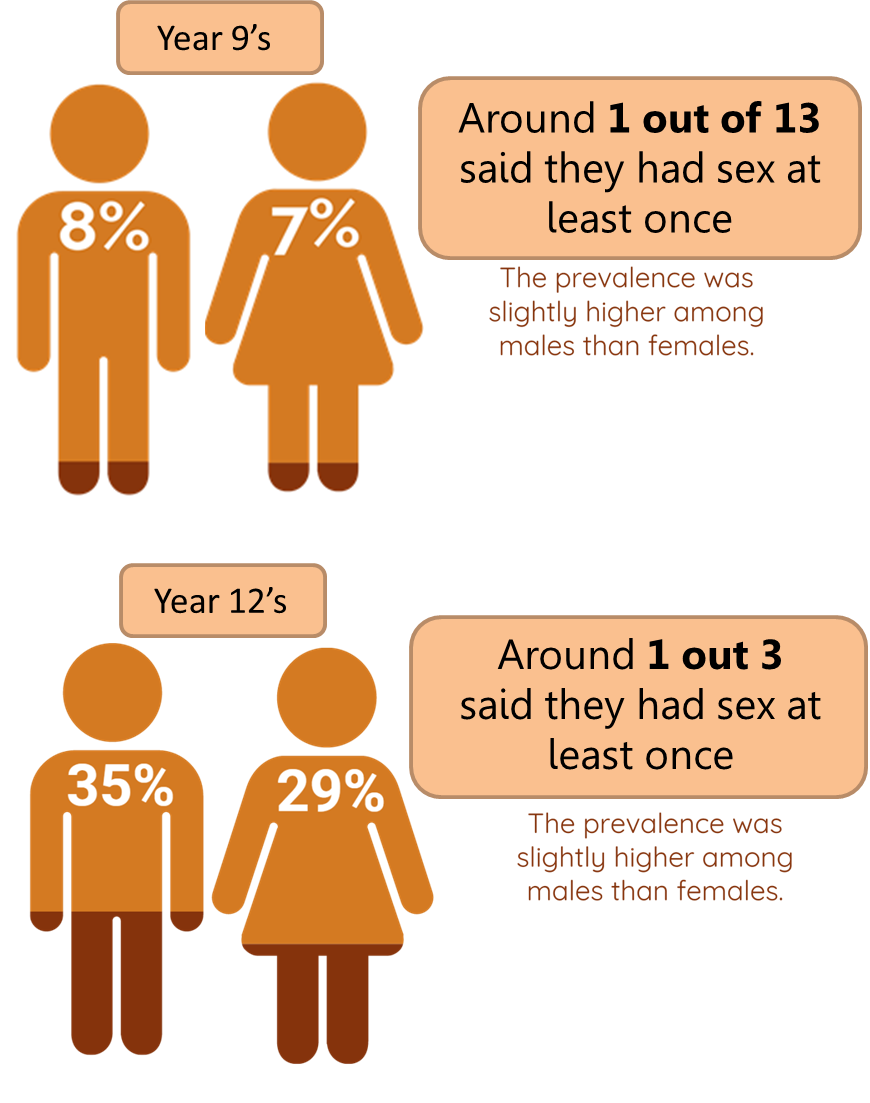
- Overall, 11% of all survey participants in Years 9 and 12 reported having had sexual intercourse at least once; this is a 1% decrease on the 2009 responses.
- Of those who were sexually active, the mode response for age of first sexual intercourse was 14 followed by 13, regardless of gender. The only notable difference was that more males reported that they’d had sex for the first time at a younger age than females.
- A larger proportion of students report having safer sex in Year 12 compared to Year 9. Fewer students reported that they never use any contraception (Figure 3) and more reported that they always use contraception (Figure 4).
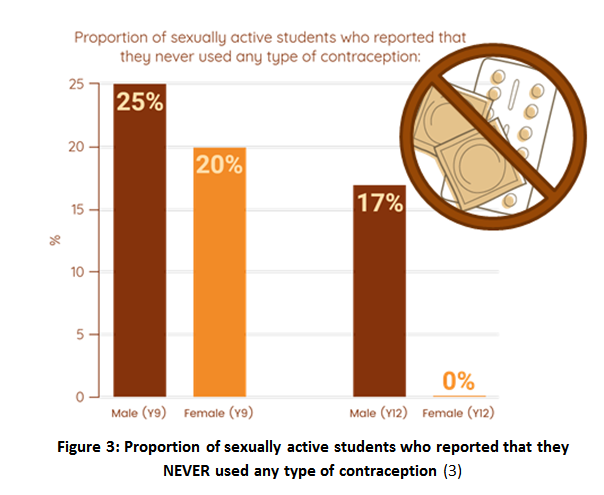
- However, males reported more risky sexual behaviour than females in both age groups but particularly in Year 12; one in six (17%) reported that they never used contraception whereas none of the females said this. Almost all (93%) of the Year 12 females said that they always used at least one form of contraception compared with just over half (54%) of males.
- 79% of teenage mothers were using contraception six months after the birth of their child (Figure 5).
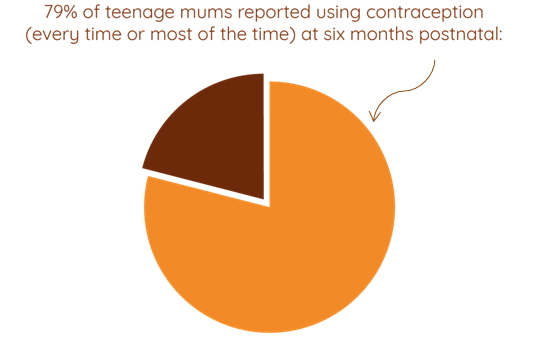
Figure 5: Percentage of teenage mums who reported contraception use (5)
Conception rates
The most recent data (see Figure 4) show that Kirklees had a lower rate of under-16 and under-18 conceptions than regionally. The rate in Kirklees was higher than the national value, but not at a statistically significant level. (7)
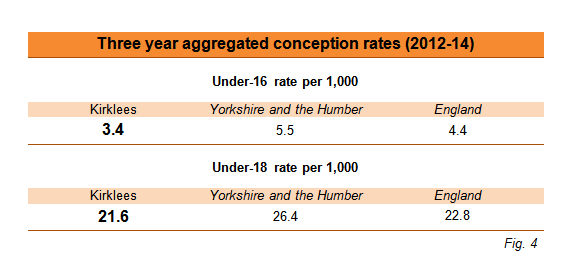 The most recent available data (7) shows that teenage conceptions in Kirklees have almost halved since 2010. The local rate is no longer significantly higher than the national rate.
The most recent available data (7) shows that teenage conceptions in Kirklees have almost halved since 2010. The local rate is no longer significantly higher than the national rate.
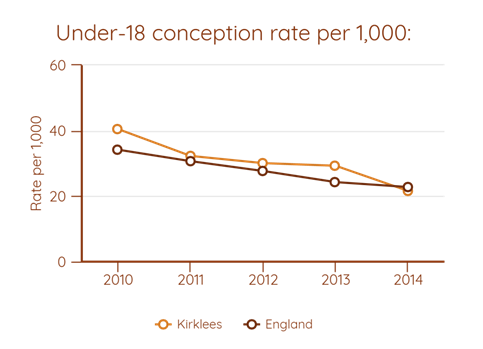
While the number of teenage pregnancies has been falling, the population at risk of teenage pregnancy has been increasing. The proportion of children and young people in Kirklees aged 0 to 19 is forecast to grow by 6% by 2022 to around 114,600, and those aged between 10 and 14 by 12%. These figures show a growing number of children who need to be prepared for adulthood, and failure to do so could lead to increases in teenage pregnancies the future. (8)
Termination of pregnancy rate
Termination of pregnancy services are available for many reasons, including when pregnancies are unwanted or unplanned.
- The most recent data shows that the proportion of teenage conceptions resulting in abortion has been increasing steadily in Kirklees. The 10 year period from 2005 to 2014 saw the rate rise from 38% to 54%. (7)
- The 2014 rate is similar to the national rate (51%); Kirklees has the highest rate of under-18 abortions in the Yorkshire and the Humber region.
- Along with decreasing conception rates for this age group, this means a smaller proportion of babies are being born to teenage mothers.
Behaviours
The Family Nurse Partnership (FNP) is a service that supports vulnerable mums-to-be, especially teenagers, from earlier in pregnancy. Their data provides insight to the current situation within the local area:
- The NHS recommends that booking appointments (the first visit with a midwife) occur between eight and 12 weeks of pregnancy to ensure that the correct support can be provided. However, the majority of FNP service users had their booking appointment after this time; 37% between 12 and 16 weeks, 42% between 17 and 22 weeks and 21% between 23 and 28 weeks. (5)
Those accessing the services of the local FNP were more likely to be smokers than the general population of Kirklees (see Figure 5). Smoking in pregnancy is a major cause of avoidable differences in health between groups. It contributes to other pregnancy complications such as placental insufficiency, high blood pressure and deep vein thrombosis for the mother and it increases the risks of asthma in the child, preterm birth, stillbirth and infant mortality including Sudden Infant Death Syndrome (SIDS).(9)

- Fewer teenage mothers initiated breastfeeding than the Kirklees population as a whole (59% compared with 75%). Likewise, at 6 weeks, a lower proportion were still breastfeeding (18% compared with 43%). (5) Breastfeeding is a key indicator of child health and wellbeing as it has some of the most wide-reaching and long-lasting effects on development.(10)
Where is this causing greatest concern?
In 2014, the rate of under-18 conceptions was 27 per 1000 which is higher than the national average (23 per 1000). The rolling figures from 2012-14 indicated that the Wards with the lowest teenage conception rates were in Kirklees Rural; Denby Dale, Kirkburton and Holme Valley South. The Ward with the highest teenage conception rate was Golcar followed by Dewsbury East and Cleckheaton. (11) See the maps below for the comparisons within Kirklees and to England rates.
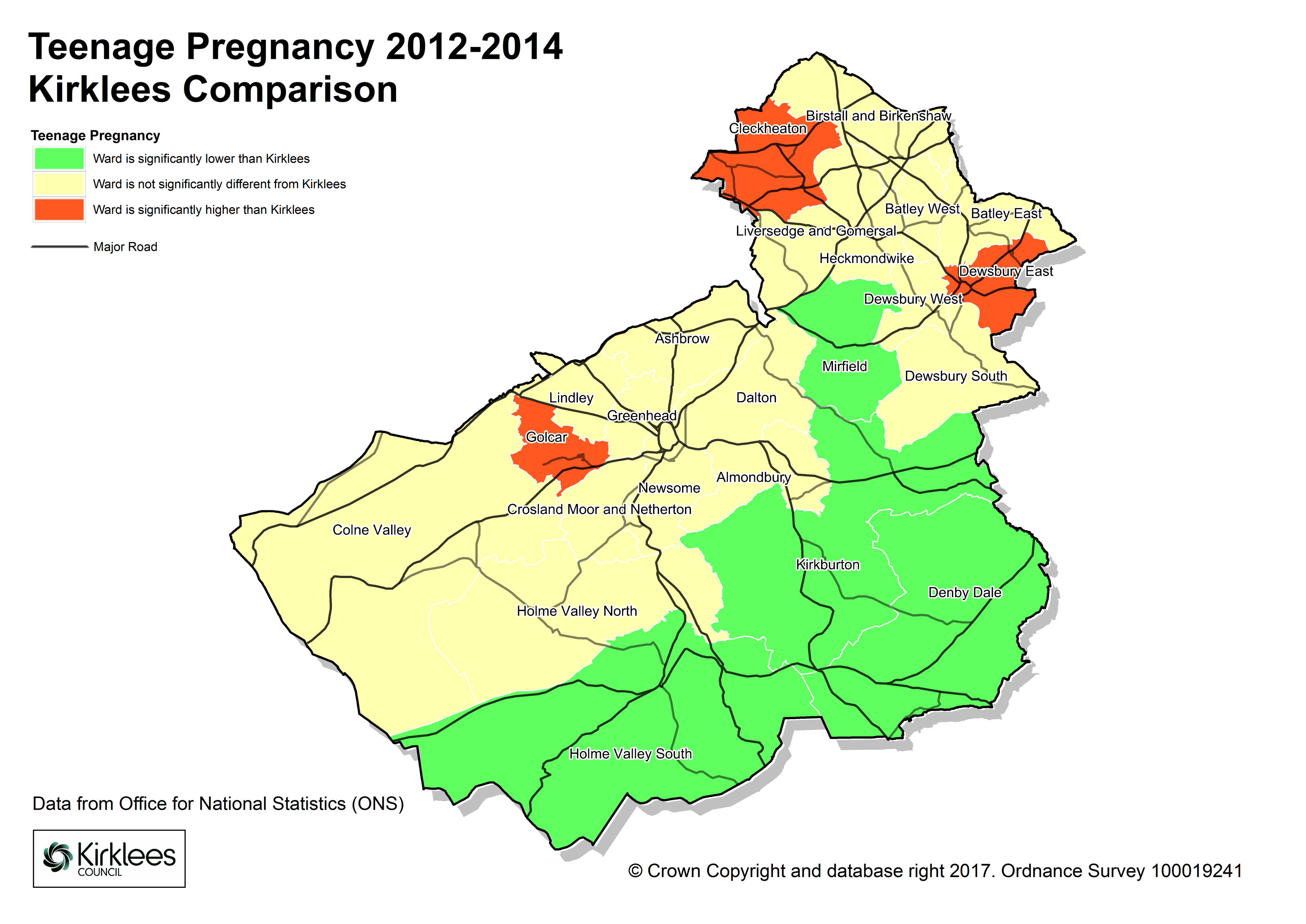
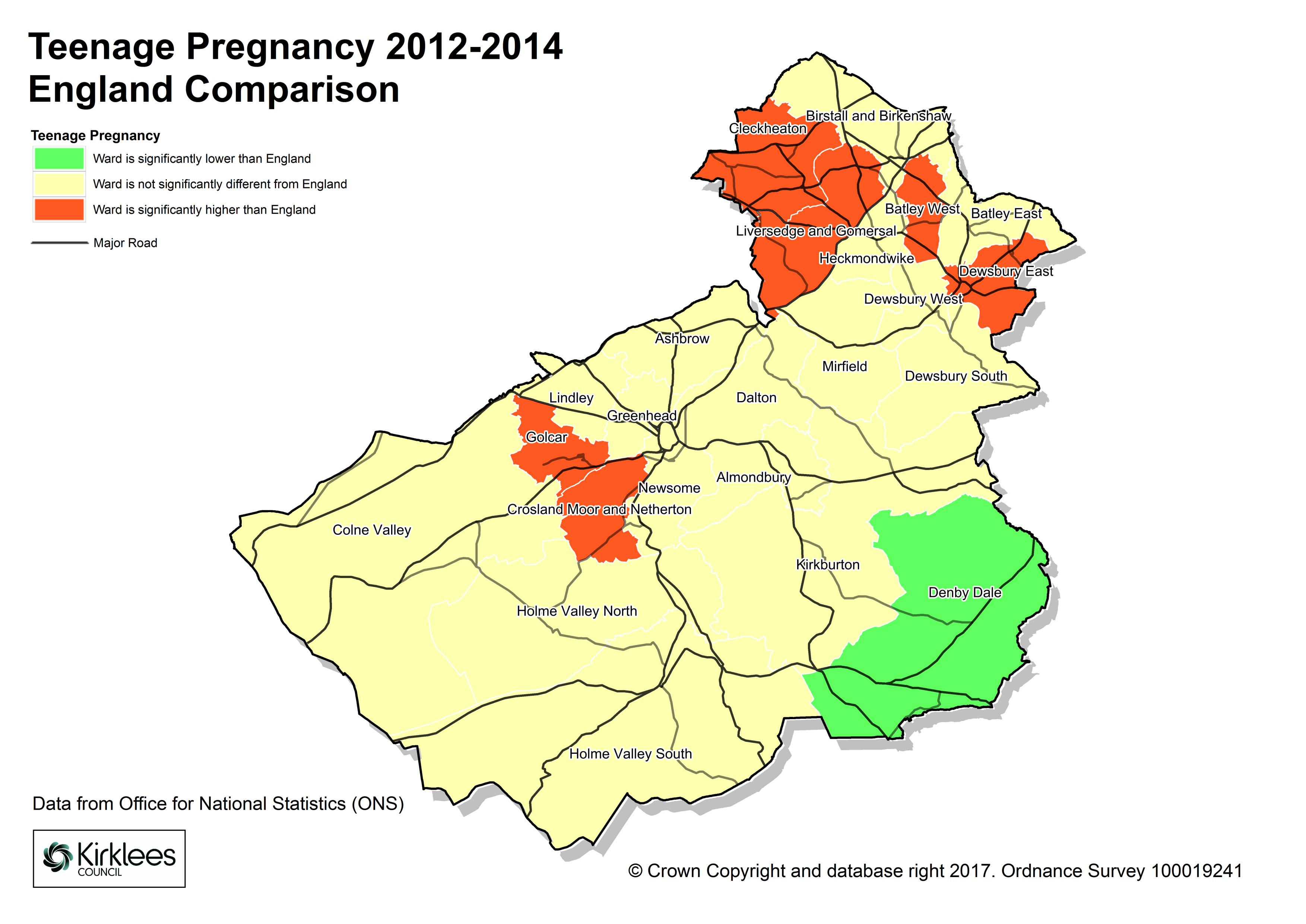 The area where a young person lives combined with individual risk factors contribute towards some young people being more likely to experience teenage pregnancy than others. Individual risk factors include family poverty, persistent school absence by age 14, slower than expected attainment between ages 11-14 and being looked after or a care leaver. The five ward areas with the greatest conceptions rates based on 2012 -2014 analysis were Colne Valley and Spen Valley, followed by Batley, Huddersfield South and Dewsbury. All of these areas have seen a decrease from the 2008 – 2010 published information.
The area where a young person lives combined with individual risk factors contribute towards some young people being more likely to experience teenage pregnancy than others. Individual risk factors include family poverty, persistent school absence by age 14, slower than expected attainment between ages 11-14 and being looked after or a care leaver. The five ward areas with the greatest conceptions rates based on 2012 -2014 analysis were Colne Valley and Spen Valley, followed by Batley, Huddersfield South and Dewsbury. All of these areas have seen a decrease from the 2008 – 2010 published information.
What are the assets around the issue?
Health assets are those things that enhance the ability of individuals, communities and populations to maintain and sustain health and well-being. These include things like skills, capacity, knowledge, networks and connections, the effectiveness of groups and organisations and local physical and economic resources. They also include services or interventions that are already being provided or beginning to emerge which contribute to improved health and wellbeing outcomes.
Assets are hugely important to how we feel about ourselves, the strength of our social and community connections and how these shape our health and wellbeing.
As part of our KJSA development we are piloting a range of methods to capture and understand the assets that are active in Kirklees. Please see the assets overview section for more information about our approach and if you are interested in place-based information about assets in Kirklees have a look at the assets section in each of our District Committee summaries (Batley and Spen, Dewsbury and Mirfield, Huddersfield and Kirklees Rural). Where possible and appropriate we will provide information about local assets supporting people across different stages of the life course.
Thriving Kirklees is a newly commissioned collaboration of services for children, young people aged 0 to 19 years and their families. Thriving Kirklees includes the health visiting service which has expertise particularly for families and children aged 0-5 years. A specialist arm of health visiting – known as Family Nurse Partnership (FNP) – supports vulnerable mums-to-be, especially teenage women, from earlier in pregnancy. It can provide more intensive and extended support, building a woman’s confidence and skills to empathise and nurture a child. This will enable more face to face contact and support for young and expectant families and build the capacity to nurture within communities.
There are a number of sexual health services for young people in Kirklees including the NHS, independent sector, local authority, and the voluntary sector, offering different levels of service. Sexual health service provisions also include programmes and schemes which are provided in partnership across a number of providers, for instance chlamydia screening programme and the C-Card scheme.
Promoting sexual and reproductive health is a collective responsibility and the Kirklees C-Card Scheme provides an opportunity for young people to talk about their relationships and sexuality in a safe, non-judgemental and confidential space that best suits them and with an adult they trust. The scheme helps to build young people’s resilience – making sure they feel safe in their use of condoms, and in their relationships, enabling them to make informed and responsible decisions.
The scheme is available through a number of services for young people under 25 across Kirklees and in conjunction with condom distribution, the scheme also provides access to free chlamydia screening and pregnancy testing is also available at some locations.
Locala’s Sexual Health Outreach Team are now based at the Princess Royal Community Health Centre (see map below). . They offer various services including: providing registrations for the Kirklees C-Card Scheme, distribution of condoms, pregnancy testing and chlamydia screening for young people under 25, peer support and provision of supplies to partner agencies and targeted outreach and prevention interventions. If you need to contact the team, their telephone number is 03330436219 or you can contact them by e-mail at checkit@locala.org.uk
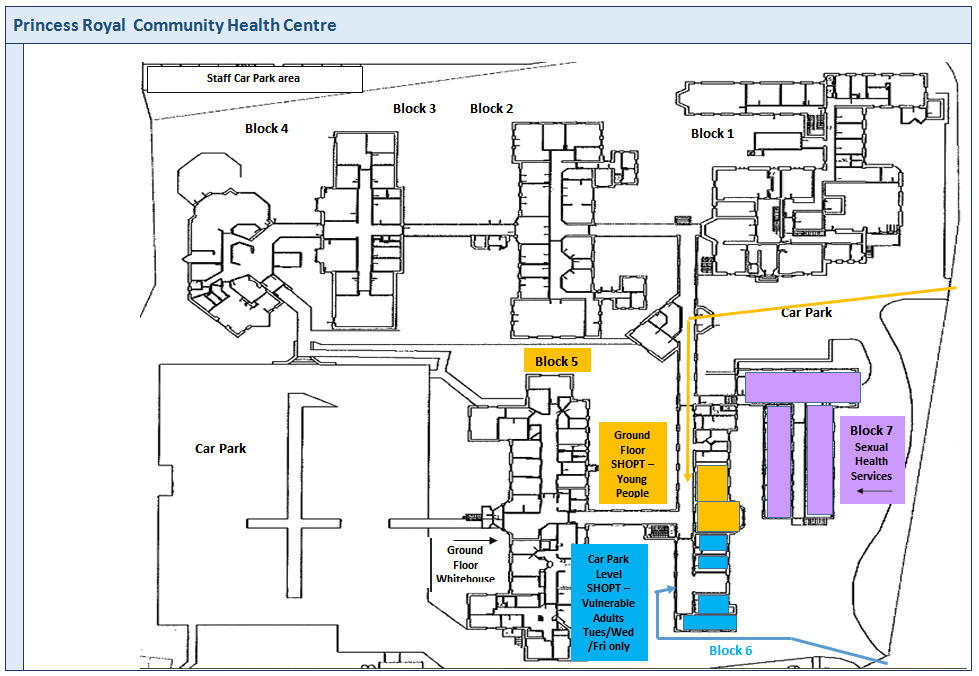
Views of the local people
Local research (12) suggests there are many positives to teenage pregnancies that can overcome the negatives. Young mothers who took part in a local survey believed that being a teenage mother is often not as bad as the media portrays. Those taking part believed they have more time with their children and even though they have no employment income, they felt they could still achieve their ambitions when their children are older giving them a better upbringing. All young mothers discussed that having a child at such a young age gave them motivation and enthusiasm to go ahead and complete education to a high standard to provide for their child.
Relationships and sexual health education need to be an integral part of the school curriculum. This will help address barriers which prevent open-door and drop-in facilities for sexual health services being available in more educational establishments across Kirklees. (13) Research has been carried out with The Kirklees Young Advisors, a group of young people trained to work with community groups, to help “adults understand what some young people see as barriers to accessing sexual health services”. They suggested that services need to address the concerns that young people do not always understand and more importantly trust, the rules regarding confidentiality. (14) The Young Advisors were aware that help and support was available in Kirklees, however they did not think that all of their friends were aware especially about the wide range of services on offer. (14)
Home-Start Kirklees University study
A study involving women from Home-Start Kirklees was completed in May 2016. (12) This small-scale research involved two focus groups of young mothers aged 15-22 years and a one-to-one interview with a professional. While the report has not been published commissioners were provided with a copy to support a review of local provisions. Three main research questions underpinned the study, to investigate and explore teenage pregnancy. Some of the views expressed by young mothers (YM) and Young Pregnant Teenagers (YPT) included:
Stigma can stop young mothers from gaining access to services that can support them; this is supported by other literature which reflects this view.

Peer pressure is a concern with some young mothers, those taking part stating it was this reason alone that caused their teenage pregnancy.
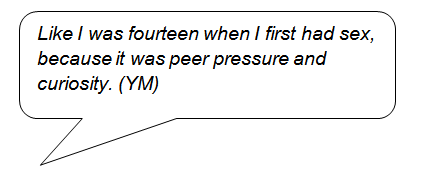
In the discussion young mothers stated that some pregnancies could be the result of the vulnerable woman seeking a source of unconditional love from a new born, and the welfare benefits that that child would bring. However, none of the participants had direct experience of this within their friend groups.
Support was considered important, although, professional support was regarded as lacking. Young mothers felt that it was the health care professionals’ education and age that determined their attitude towards teenage pregnancy.
Good support remains fundamental for a teenage mother.

Some young mothers voiced that professional support can be daunting and not as helpful as family support, for instance young mothers stated that overnight help and the emotional support they receive from family is not available from the professionals involved.

Young Parents Journey
In 2015, a small group were interviewed to find out their experience of being young parents. (15) This highlighted some of the issues young parents are facing such as the impact on their education, finances, housing options and social environment. The young parents made several suggestions, ideas and solutions for change including:
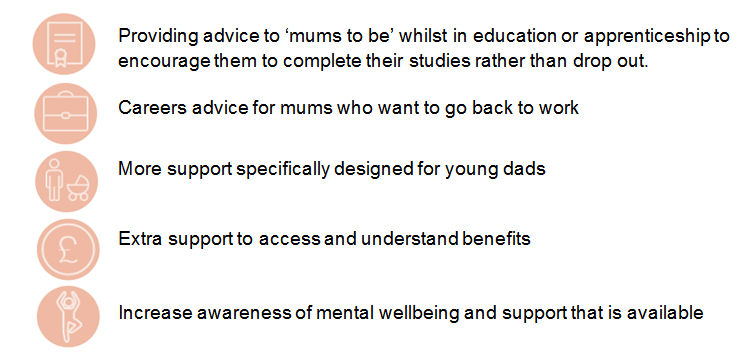
What could commissioners and service planners consider?
Commissioners, service planners and Councillors should consider local community assets such as those outlined above so that they can support and build on local strengths and also understand where there are gaps and unmet needs in particular places or amongst particular communities.
Findings from the Kirklees Children and Young People’s Survey (CYPS) (3) suggest that the preferred choice for accessing information about their sexual health for Year 9s was the Internet (21%) followed by their doctor (17%) and then school (14%). Similarly, Year 12s reported the most common sources of advice were from the Internet (29%), their doctor (23%) or school (12%).
Despite reduced conception rates, further progress is required to continue achievements, narrow variations between areas and improve outcomes and the emotional health and wellbeing of young people. The downward trend may not be sustained if Kirklees fails to enable young people to make informed choices about their sexual and reproductive health. Early help contributes to prevention by (1):</p
- Reducing the risk factors associated with teenage pregnancy by helping teenage mothers, young fathers and their children fulfil their potential
- Supporting young parents to prevent subsequent unplanned pregnancies
Build in best practice:
Challenges remain to provide young people with the means to avoid early pregnancy and unplanned conceptions as well as tackling the underlying conditions which lead to them. Evidence and lessons learned from other areas identify the following key actions required to sustain reductions in teenage conceptions. (1)
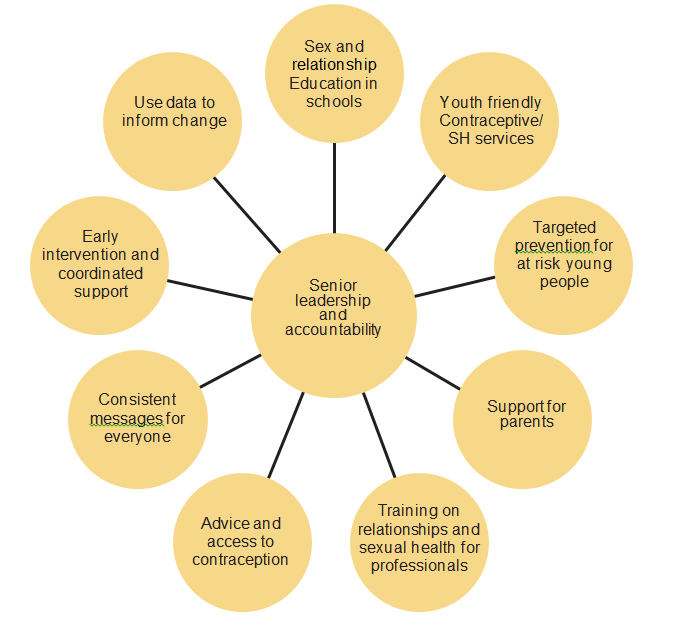
Evidence from those areas that have made the largest reductions in teenage conceptions suggests a range of factors must be in place to achieve success. (1) These include:
- Focus on targeted interventions for young people at greatest risk
- Training in sex and relationship for partner organisations
- Well-resourced youth services
- Support for young people who want to become parents
- Postnatal support
Reviewing data:
Efforts continue to preserve a downward trend and reduce inequalities between ward areas across Kirklees. Whilst there is no longer a national or local teenage pregnancy strategy, overseeing of teenage conceptions, terminations and young people’s sexual health are included in the Kirklees Children and Young People Plan (16) and overseen by the Children Trust and Health and Wellbeing Board. Strategically commissioners need to consider opportunities which enable appropriate local responses, this includes:
- Reviewing abortion data analysis is needed to understand barriers for young women experiencing poor or no contraception used following a termination.
- Reviewing analysis of repeat use of Emergency Hormonal Contraception to identify young women at risk of poor contraceptive use and sexual health.
- Reviewing analysis of the use of and take up of Long Acting Reversible Contraception and condoms in young people under 18.
- Strengthening links with voluntary community services and GPs to increase access to contraception and sexual health services.
Support for new dads:
The behaviour of young males is central to preventing teenage pregnancy and potential childbearing responsibilities. Research and data focus on female, as a result, less is known about strategies to engage males in preventing teenage pregnancies or addressing attitudes toward being a father. Approaches need to consider responsible sexual behaviour combined with information about building healthy relationships, talking about contraception before sex, using contraception, nurturing parent approaches and for males take responsibility for any child they father.
Joined up pathways:
Locally anyone that works with, supports or advises young people need to consider how they can contribute to addressing local teenage conception priorities.
References
- Local Government Association of England. A framework for supporting teenage mothers and young fathers. 2016. Available from: https://www.gov.uk/government/uploads/system/uploads/attachment_data/file/524506/PHE_LGA_Framework_for_supporting_teenage_mothers_and_young_fathers.pdf
- Department for Children, Schools and Families. Teenage Pregnancy Strategy: Beyond 2010. 2011; Available from: hhttps://www.education.gov.uk/consultations/downloadableDocs/4287_Teenage%20pregnancy%20strategy_aw8.pdf
- Kirklees Council. Children and Young People’s Survey 2014.
- Newbury-birch D, Walker J, Avery L, Beyer F, Brown N, Jackson K, et al. Impact of Alcohol Consumption on Young People A Systematic Review of Published Reviews. 2009;1–66.
- Family Nurse Partnership. Indicator Dashboard. 2017.
- Fallon D, Broadhurst K, Ross E. Preventing unplanned pregnancy and improving preparation for parenthood for care-experienced young people. Coram. 2015. Available from: http://www.scie-socialcareonline.org.uk/preventing-unplanned-pregnancy-and-improving-preparation-for-parenthood-for-care-experienced-young-people/r/a11G000000DeHRMIA3
- Office for National Statistics. Teenage conception data 2012-14. 2014.
- Public Health England. Child Health Profile 2016. Available from: http://www.chimat.org.uk/profiles
- Royal College of Obstetricians and Gynaecologists. Smoking and pregnancy. 2015.
- Unicef. The Benefits of Breastfeeding. Available from: https://www.unicef.org.uk/babyfriendly/what-is-baby-friendly/the-benefits-of-breastfeeding/
- Kirklees Council. Teenage conceptions Ward level 2012-14. 2014.
- Hunter L. What are Teenage mothers’ perspectives of teenage pregnancy and the support services available during pregnancy? 2016.
- Kirklees Council. Ad Hoc Scrutiny Review, Looking into Teenage Conception. 2012.
- Kirklees Young Advisors. Reviewing Sexual Health Services for Young People in North Kirklees. 2012.
- Kirklees Council. Young Parents’ Journey: An exploration of the life experiences and issues affecting the wellbeing of young parents in Kirklees. 2015.
- Childrens Trust. Kirklees Children and Young People Plan. 2016
Date this section was last reviewed
06.03.17

